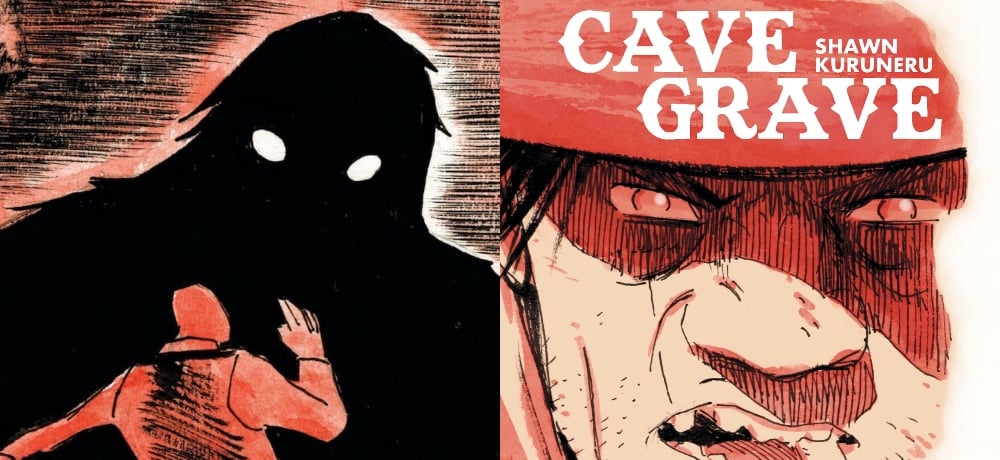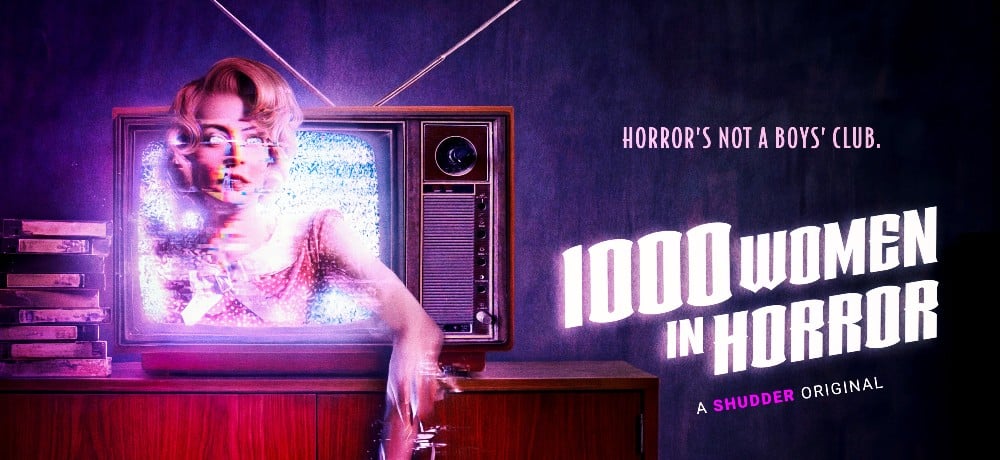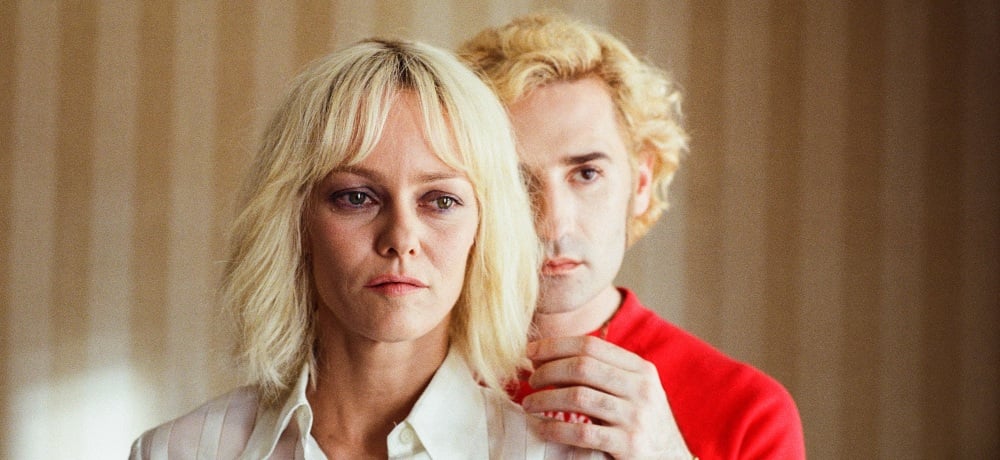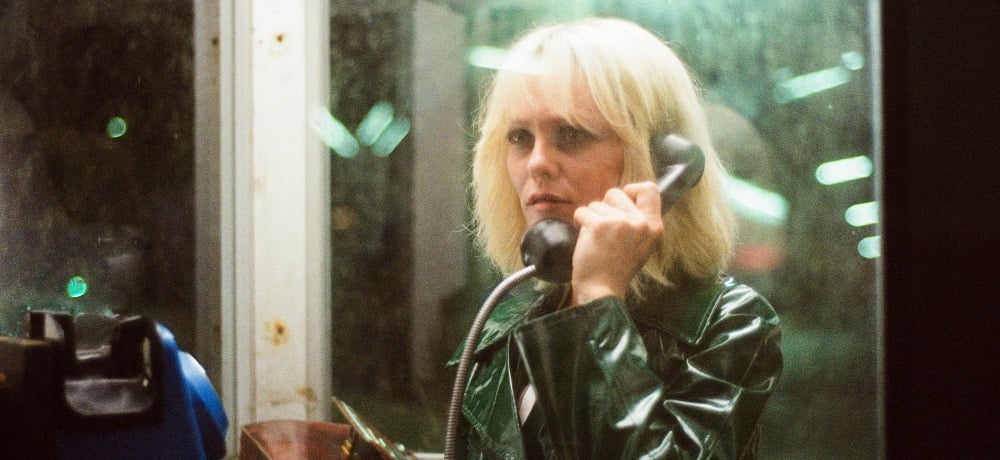






Happy New Year, and welcome back for another edition of Let’s Scare Bryan to Death. This month I’m talking to Kay Lynch, founder and director of Salem Horror Fest, an annual event held in (you guessed it) Salem, Massachusetts. SHF features thought-provoking films, lectures, and other great programming from the horror genre, and Lynch brings an eclectic mix of content to the festival every year, so I was interested to see what they’d recommend for this month’s movie.
As it turns out, Lynch recommended a movie that’s already forcing me to break my only rule for this column, as we are going to be discussing a film that I’d actually already seen. I checked out the 2019 giallo homage Knife + Heart earlier in the year when it came out on Shudder, but I loved it so much that I couldn’t pass up the opportunity to discuss it with Lynch (spoiler warning: this conversation will include significant plot points from the film).
Directed by Yann Gonzalez, Knife + Heart follows Anne (Vanessa Paradis), a director and producer of gay pornography in late ’70s Paris, whose relationship with her longtime partner and editor, Lois (Kate Moran), is ending due to Anne’s alcohol abuse and emotional manipulation. To make matters worse, just as Anne is starting production on her next film, a masked killer has begun targeting her crew. With little help from the police, Anne is forced to solve the mystery on her own while also juggling her own emotional baggage.
Lynch admits that there are some barriers to Knife + Heart gaining mainstream popularity, as they point out “it's in French, there are subtitles, it's about gay porn, and it has gruesome deaths.” Yet at the same time, we both found it to be a very thoughtful, touching film, which is perhaps a tough sell when also describing a film that features a killer wielding a knife dildo. Lynch, however, also points out that to dismiss it as stylized exploitation is to miss Gonzalez’s nuanced exploration of queer culture in the late ’70s.
Certainly, you can tell that he was inspired from a lot of sleaze, a lot of Italian exploitation. His previous film, You and the Night, is a film about a pansexual orgy. So clearly he's interested in the more sexual journey, the darker side of humanity. But I think with [Knife + Heart] I've seen a largely positive response to it… but the biggest critical comment I've seen from people is that it's “style over substance.” I would argue that the style is the substance because the film is ultimately a film within a film. The story that Anne is producing for the porn reflects what is happening in real life, and so I think of all of the elements in the film that are hyper-stylized, like the [Nicolas] Refn-like neons, the M83 score, the fact that it’s shot on 16 and 35 millimeter, which gives it a literal texture, there’s such a flourish for aesthetic that it can be easy to kind of just consider it on that level. But I think what you have is a story that is ultimately about artifice to some degree. I've been trying to think about what the film is ultimately about, and where I am right now is that it's about the end of immortality. It takes place in a demarcation between “before AIDS” and “after AIDS.” This is 1979 Paris, and you have this world, this community that is extremely hedonistic. They are very free with their sexuality, and free to be who they are. In fact, in this world, it’s as if it's free of heterosexuals altogether.
Gonzalez is depicting a world where being queer isn’t all there is to his characters. And while AIDS is certainly a specter we can see looming over the group given the time period, coming face to face with the loss of immortality takes several forms in the film. It could be the literal loss of life due to a masked killer, or, as is the case with Anne, it could be the loss of the life you’ve imagined for yourself and the ripple effect that has on those around you.
The entire film weighs on her. It's her story. At the same time, the relationship with the woman she loves has ended, or is ending, and she just hasn’t come to terms with it yet. Her career seems to be going on kind of a downslide. She is always looking for validation, asking, “Am I still beautiful?” So she's a desperate character, but the film goes to show how much she cares about her art. She's very passionate in her directing and her entire life seems to be about creating art, creating these films and how much she puts into it. As toxic as she is to Lois, you can see that Lois is still inspired by her and still loves her in some form…
…I've been trying to figure out, what does Anne represent? Because in the film within the film, she plays the killer. She casts herself as the killer, and sort of the one responsible for the all the mayhem. So on some level she is attracting this energy, all this danger. [One of the] lines in the film is, “She saw so many [gay porn] films, she thought she was a fag… she is a mother by day and murderer by night.” She's kind of like this Wendy figure, where there's all the Lost Boys and then there's Wendy, which actually goes towards the immortality aspect of not growing up, of being in this perpetual world of pleasure and pain [and] self-discovery.
As Anne’s world begins to crumble, we see the film’s symbolism begin to interweave. We learn that the killer, Guy (Jonathan Genet), was almost killed by his father when he caught him sleeping with another boy. A mythical bird took the burden of Guy’s pain only to be blinded when trying to fly close enough to the sun to get rid of it. Lynch posits that for Anne, Lois represents her black bird, both professionally and personally.
Anne is the director. As this creator, she's putting all this passion and telling the story and just sort of this unmanaged chaos. Lois is the person who has to take all of that and edit it down to something usable, something functioning. Then at the very end, Lois ultimately sacrifices herself for Anne. The killer’s coming for Anne, and ultimately [Lois] is the one who gets stabbed… Lois is the bird and Anne is the person who is trying to survive the sickness. I think sickness, in the context of this film, is a few different things: sickness is the degree of obsessive, possessive love she's infected with, this obsession. And that's something that she needs to be cured of. That's her arc ultimately, is to find a way to move on. And also the sickness that is coming with the turn of the decade with the AIDS crisis right on the verge of that, and so every character is now at risk.

Anne is a very complex character, for as much as you can sympathize with her, you also can’t dismiss how her toxic behavior affects those around her, not only with Lois, but also in how cavalier she is in her approach to managing her crew. Lynch points out that while Anne may be Wendy to the men’s Lost Boys, she’s also a bit of an irresponsible authority figure, which is important considering the context that Lynch gives concerning development for people who have had to repress their sexuality.
With the gay community, being a gay man, there is a conversation about Peter Pan complex. And so I've heard a lot about this sort of thing when you’re growing up and you’re suppressing your sexuality—it delays your growth to some degree. And so if you come out at 18 or 43 or whatever time you come out, that almost becomes the time that you mature. And so, especially at that time, there's this delayed maturity for a lot of people because they're suppressing this aspect of themselves. So they were living that on loop, and just seeking pleasure. And if you look at it biologically, the function of sex is different no matter what your sexuality is. There is pointless pleasure to be had, or eroticism for the sake of it. But just the mechanics of gay sex, there's no real reproduction, that isn't the purpose of it. So I think part of this world is they have the freedom to do that. I think that's also where the artifice comes from. It's like this hedonistic world of sex without consequences until the party is over, until AIDS all of a sudden becomes a thing. I kind of see this as like the last gasp of this sort of pure hedonistic time for them.
Of course, within this context, Guy makes for a convincing avatar for the AIDS crisis. But given that this is a movie that encourages multiple interpretations, Lynch also sees Guy as a symbol for the collective trauma endured by the queer community.
He's the consequence [AIDS], but he's also the product of trauma. The fact that he was in love with this boy, his father discovered them and cuts off his d*ck and burns the barn down, killing his boyfriend and maiming him in the process. So obviously he was never going to have an opportunity to have a happy life as himself, as who he was meant to be. So I think in a literal sense his purpose in the film is how trauma can impact people with this experience, but also how people can react to trauma and sort of the self-sabotage of taking their pain out on others. But in doing so, he represents this death force that is working its way through a community.
Gonzalez is adept at creating a story that defies black and white interpretation or black and white morality, which Lynch explains in their take on Guy’s ultimate demise in the film’s climax.
It's tragic. It's very tragic, because you know his backstory, and to some degree you can feel bad. He's done terrible things, but you know that's in response to terrible things that have been done to him. But it's also filmed in a very sort of tragic way, depicting him on the stage, in front of the screen. And the way he gets stabbed is almost like a Caesar and Brutus-type thing. He doesn't get stabbed in the back, but you've got this “Congress of Queers,” and the young guy just stabbing him. But I do think there is something beautiful of the fact that the community in that room banded together, and they knew they had to take care of it. Only they could take care of this issue. And I think it reflects to the family aspect of characters in the rest of the film and how there this tight-knit community.
That’s really what really makes Knife + Heart so special. It’s a film that confronts tragedy, both at a personal and at a societal level, but finds a way to weave in joy and beauty in a way that few films have been able to accomplish. And while some may find it leans too heavily into aesthetics, it’s a deceptively deep movie that rewards repeat viewings with potentially new interpretations. Plus, as Lynch explains, it explores the queer community without the stigma that’s so often attached.
There’s so much to unwrap here. The style of course is beautiful. It's a beautiful film. It's really pretty, even the score is incredible. It's just great music. The performances are all great, but the layers of what [Gonzalez] is exploring and the fact that there can be many interpretations to what is happening, I think it's really exciting. And as a queer person to have a film like this is really special. There are clearly some ties to [the 1980 film] Cruising, there are some similarities, but I would say the biggest difference is in Cruising you have Al Pacino playing this character from the outside, being the conduit in which he descends into this underground. And it is very much drenched in shame, there is a lot of shame in [Cruising]… I don't think there was any judgment [on behalf of] the storytellers, but just in the world I had this sense of shame by the killer in that film.
But in [Knife + Heart], I think there's a joy, there are no characters who are shameful about who they are or the world they live in. They're all unapologetically themselves and have the freedom to be themselves, except for Guy, of course. I just think that this is sort of the more, it's strange to say it, but a more joyful approach to that. And part of that I think is the color and the style of it. It’s just more colorful and everything. But I think that there's no shame in who these people are… Being gay isn't really an issue in this film. That's not the issue, that's not the problem. A lot of gay films tend to be “it's a coming out story, it's a hate crime story, it's a dying of AIDS story.” And this certainly has all those elements, but the story is really about these characters are who they want to be. The circumstances, they’re dealt with, and I think there's just something really beautiful in that, to have something that takes the canon of Cruising to a whole other level.
Trailer via Bloody Disgusting: